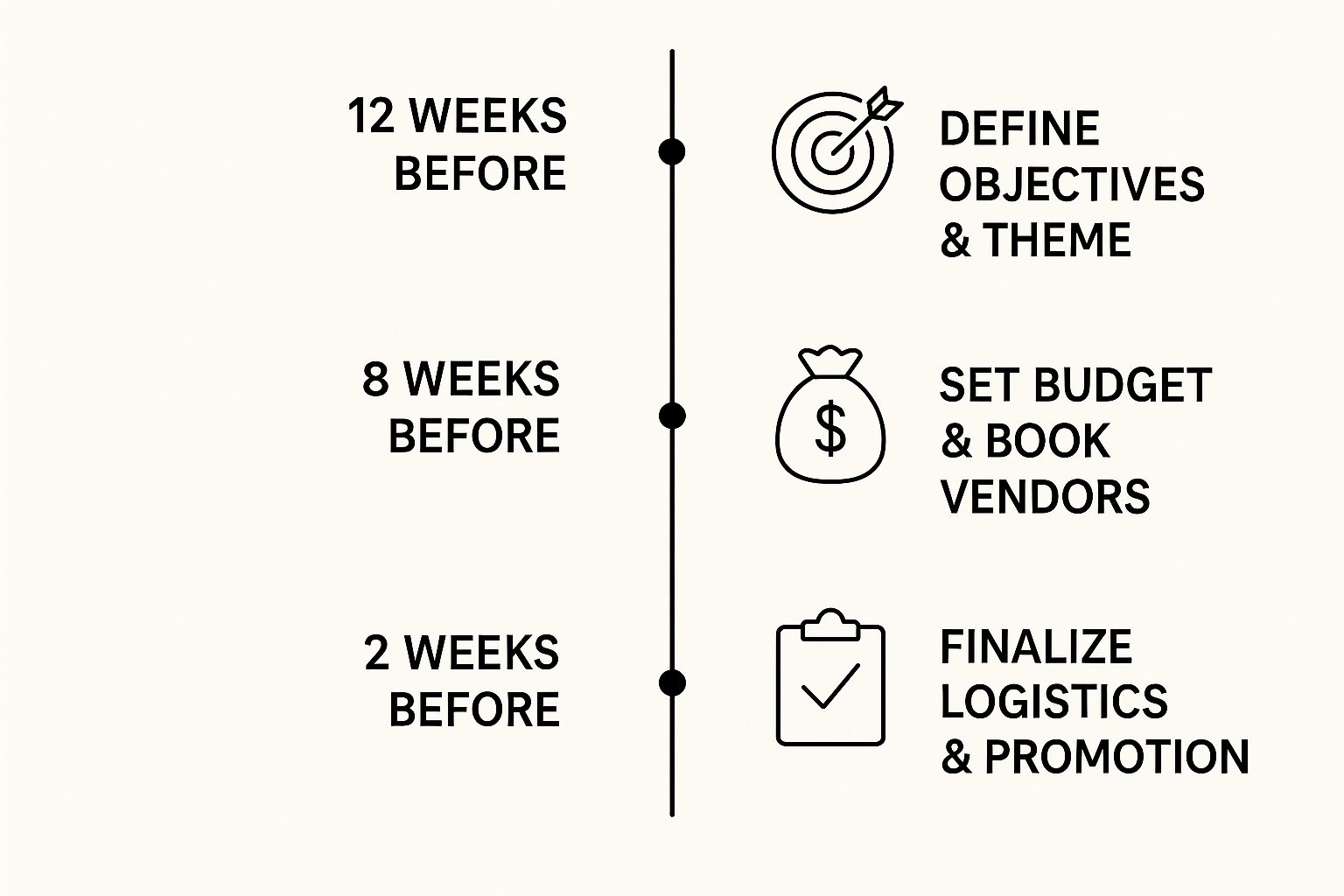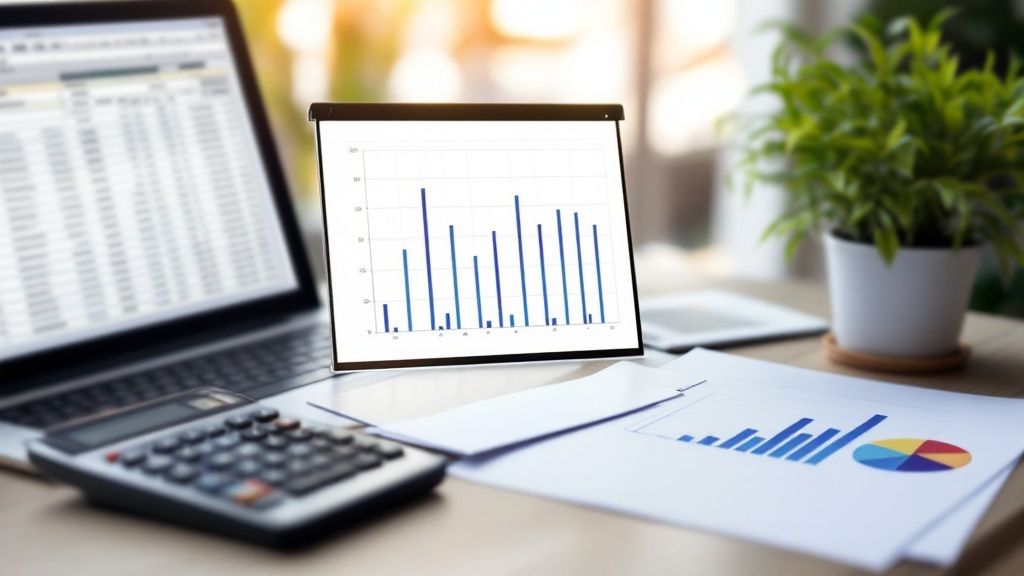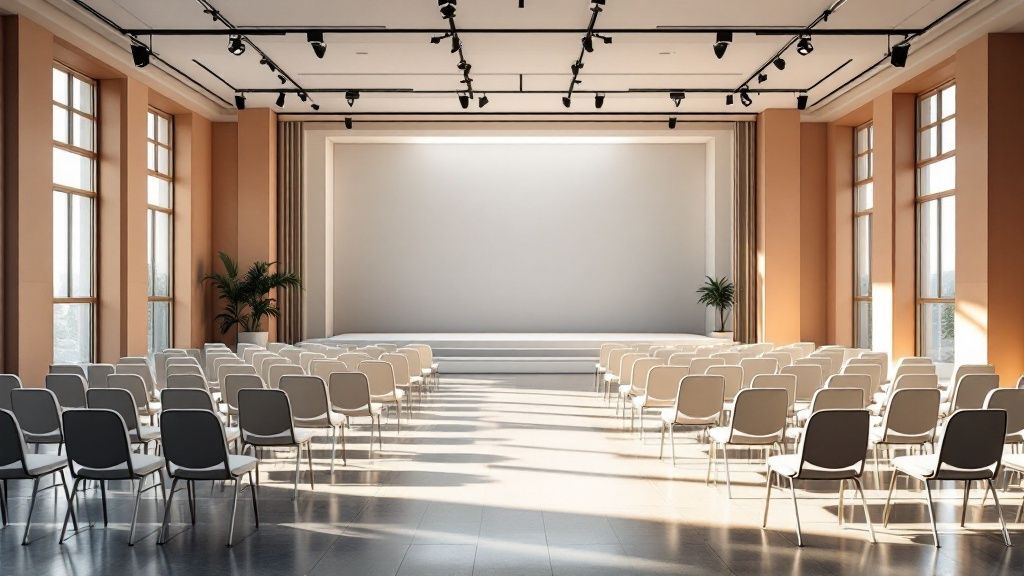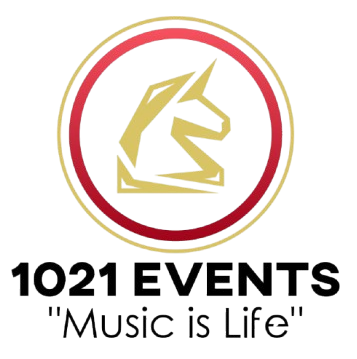Starting Your Event Planning Journey The Right Way
Planning an event can feel overwhelming, but like a fun road trip, having the right map makes all the difference. Experienced event planners know that nailing the basics is key. These first steps set the stage for a killer event, and it all starts with figuring out the event’s purpose. What’s the message? What do you want to achieve? Knowing who you want to attend is just as important. Understanding their needs and wants helps you create an event that’ll really resonate with them.
Defining Your Objectives and Identifying Your Audience
Think of this first phase as your event’s GPS. It guides every decision you make. Start by getting clear on your objectives. Are you trying to raise awareness, launch something new, or build a community? Once those objectives are locked in, focus on your audience. Think about their demographics, interests, and what makes them tick. What problems do they have, and how can your event offer solutions? Understanding this shapes everything from the venue to the activities.
Establishing a Realistic Timeline
A realistic timeline is like having a solid budget—it keeps you on track and prevents last-minute panics. This means not just listing milestones but also adding in extra time for bumps in the road. It’s like adding a cushion to your schedule for when things go sideways. For example, if you think a task will take two weeks, give yourself three. This proactive approach takes the edge off unexpected challenges. Check out this helpful resource: How to master an event planning checklist.
The following infographic offers a simplified event planning timeline:

As the infographic shows, starting early gives you breathing room for each planning phase. Defining objectives and themes 12 weeks out builds a strong base. Booking vendors eight weeks in advance secures your top choices. And finalizing logistics two weeks before the event lets you focus on flawless execution.
To further illustrate the planning process, let's take a look at the following comparison:
| Event Planning Timeline Comparison | Comparison of planning timelines for different event types and sizes |
|---|---|
| Event Type | Recommended Planning Time |
| — | — |
| Small Networking Event | 4-6 weeks |
| Mid-Sized Conference | 3-6 months |
| Large-Scale Festival | 1-2 years |
This table highlights how the scale and complexity of an event directly influence the necessary planning time. Larger events require a much longer lead time to manage the numerous moving parts involved.
Leveraging Technology and Stakeholder Alignment
Event planning relies heavily on tech these days. In fact, event management has seen a huge surge in tech adoption. By 2025, a whopping 79% of event pros will be using an Event Management System (EMS) like Eventbrite to streamline planning, a major shift away from manual processes. With the global event management software market valued at $14.37 billion in 2025 and predicted to hit $107.28 billion—that’s some serious growth—organizers are using digital tools for everything from registrations to data analysis. You can find more stats here. These platforms are super helpful for managing budgets, tracking timelines, and keeping in touch with vendors.
Finally, getting everyone on the same page is critical. This means making sure all stakeholders, from sponsors to venue staff, are aligned. Regular communication and clearly defined roles prevent misunderstandings and help things run smoothly. Starting your event planning journey the right way means clear objectives, a realistic timeline, and open communication. These are the building blocks of a successful and memorable event.
Creating Bulletproof Event Budgets That Work
Budgeting might not be the most exciting part of event planning, but it's definitely the most important. It’s like laying the foundation for a house – you need a solid base to build upon. Let's explore how experienced event planners create budgets that not only work but also protect against unexpected costs. It all comes down to understanding where your money is going and anticipating potential problems.
Understanding Event Budget Components
A well-structured budget breaks down every anticipated expense into clear categories. Think of it as a financial roadmap for your event. Key areas typically include:
- Venue: This usually eats up a big part of your budget and includes rental fees, catering, and sometimes even AV equipment.
- Marketing and Promotion: Getting people to your event means spending on advertising, social media campaigns, and promotional materials.
- Speakers/Entertainment: If you're featuring speakers, performers, or other talent, budgeting for their fees and travel is essential.
- Logistics: This covers less obvious but essential costs such as security, staffing, transportation, and permits.
- Contingency Fund: This is your safety net for unexpected expenses or surprises – and it’s crucial.
Hidden Costs and Negotiation Strategies
Savvy event planners know the initial quote isn't the final price. Hidden costs can pop up unexpectedly, so it’s important to be thorough. For example, service fees, taxes, and those last-minute additions can quickly inflate your expenses. Negotiating with vendors is a must-have skill. It involves researching comparable services, being upfront about your budget, and not being afraid to ask for discounts or combined packages.
Building Contingency Funds and Tracking Systems
A contingency fund isn’t optional; it’s essential for responsible budgeting. Think of it as event insurance. Aim for around 5-10% of your total budget. This financial buffer can cover unexpected costs without derailing the entire event. Reliable tracking systems are equally important. Spreadsheets, budgeting software, or event management platforms can help you monitor spending and stay on track. For more on budgeting templates, check out this helpful resource: How to master an event budget template.

Revenue Models and Sponsorship Strategies
Generating revenue is often a key part of event planning. This could be through ticket sales, sponsorships, or even merchandise. Understanding ticket pricing is crucial for attracting attendees while meeting your revenue goals. Creating appealing sponsorship packages that offer real value to businesses is also a vital skill. This might include brand visibility, speaking opportunities, or exclusive access to attendees. Investment in events is growing globally, with budgets expected to increase. Industry studies show 74% of event marketers predict budget increases, with only 5% expecting a decrease. This positive outlook is driven by projections that the events industry could grow from approximately $1.02 trillion to a whopping $3.27 trillion by 2033. You can find more detailed statistics here. Ultimately, a bulletproof budget takes careful planning, smart negotiation, and meticulous tracking. It’s the foundation of a successful and financially sound event.
Securing The Perfect Venue And Mastering Logistics
Choosing the right venue is way more than just finding a nice-looking space. It's the bedrock of your entire event! This means thinking about every little thing, from how easy it is to get there and how many people it can hold, to hidden costs and tricky logistics. You're basically the conductor of an event symphony, orchestrating all the different parts of your venue and logistics to create a killer experience.
Evaluating Venues: A Systematic Approach

Pro event planners have a system for evaluating venues. They look past the pretty pictures and focus on the practical stuff that can make or break an event. They ask key questions about things like:
- Capacity: Can the venue comfortably fit everyone you’re expecting? Too many people crammed in can be a nightmare, and a half-empty room can feel a bit awkward.
- Accessibility: Is the venue accessible for attendees with disabilities? This means things like ramps, elevators, accessible restrooms, and other accommodations.
- Layout: Does the layout work for your event? Think about where the stage will be, how the seating is arranged, and if there's room for people to mingle or have breakout sessions.
- Amenities: What's included in the rental fee? Tables, chairs, linens, AV equipment, on-site staff? You need to know!
- Hidden Fees: Are there any surprise costs that could mess with your budget? Things like service charges, cleaning fees, or security deposits can really add up.
Mastering Venue Negotiations and Site Visits
Negotiating with venues is a skill. Be clear about what you need, how much you can spend, and what you expect from the venue. Asking the right questions is what separates the amateurs from the pros. Something as simple as asking about different dates or times can sometimes get you a better price.
Site visits are super important for catching potential problems before they turn into event-day disasters. It's like detective work – you're looking for clues! Check out the lighting, acoustics, Wi-Fi strength, and the general condition of the space. Don't just rely on photos or brochures.
Coordinating Logistics: Catering, AV, and More
Logistics are the engine that keeps your event running smoothly. This means managing a bunch of different vendors, coordinating tricky details, and being ready for anything.
- Catering: A good relationship with your caterer is essential for happy attendees. Make sure they know about any dietary restrictions, allergies, or special requests.
- AV Requirements: If you have presentations or performances, you need to get the AV stuff sorted. Test everything beforehand to avoid technical glitches during the event.
- Transportation and Parking: Figuring out parking and transportation can make a huge difference for your attendees. Think about offering shuttle services, valet parking, or clear directions to public transit.
- Backup Plans: Always have a Plan B (and maybe even a Plan C!). Just like having a spare tire in your car, these plans help you deal with unexpected surprises.
Communication: The Key to Success
Good communication is the glue that holds everything together. Keep in touch with your vendors, your team, and everyone involved to make sure everyone's on the same page. This proactive approach helps to avoid confusion and stops small problems from becoming huge headaches. Think of communication as the conductor's baton, keeping everyone in sync and working together towards a successful event. By nailing these logistical details, you're setting the stage for a truly memorable experience.
Designing Programming That Keeps People Engaged
Great events aren’t just about logistics; they’re about creating engaging experiences that stick with attendees long after it’s over. This means putting together programming that grabs attention, delivers real value, and gets people talking and interacting. Let’s dive into the key ingredients for designing event programming that keeps the energy high and the conversations flowing.
The Art of Speaker Selection: Beyond Big Names
Picking the right speakers is essential. A big name might attract a crowd, but real value comes from speakers who genuinely connect with your audience and offer relevant content. This means looking past fame and focusing on expertise, presentation style, and the ability to inspire. Think of it like creating the perfect playlist – a mix of energy, insights, and emotion to keep everyone captivated.
Interactive Elements: Fostering Meaningful Engagement
Interactive elements can turn passive listeners into active participants. But these activities need to feel organic, not forced. Think about incorporating Q&A sessions, live polls using tools like Mentimeter, or small group discussions. These create chances for attendees to share their thoughts and connect with each other, building a sense of community. Check out this resource on party entertainment ideas for more inspiration.
Structuring Your Agenda for Optimal Flow
A well-structured agenda is like a good story: it has a clear beginning, middle, and end. This means organizing sessions and activities to build momentum, include breaks, and maintain a steady level of engagement. Consider alternating between high-energy presentations and more relaxed sessions to avoid attendee fatigue.
Choosing the Right Session Formats
Different people respond to different formats. Offering a variety of presentations, workshops, panels, and networking opportunities caters to various learning styles and preferences. For example, a workshop allows for hands-on learning, while a panel discussion offers diverse viewpoints on a single topic.
Technology’s Role: Enhancing, Not Complicating
Technology can be a powerful engagement tool, but it shouldn't complicate the experience. Think about using event apps like Eventbrite for scheduling, communication, and interactive features. Make sure the tech is user-friendly and adds value instead of creating more hassle.
Managing Speaker Logistics and Event Materials
Behind the scenes, managing speaker logistics is key. This includes arranging travel, communicating clearly, and ensuring their needs are met. Creating event materials people want to keep is another chance to elevate the attendee experience. Go beyond generic brochures and provide valuable resources, takeaways, or branded items that extend the event’s impact.
Creating Memorable Experiences: The Takeaway
Designing engaging programming is all about understanding your audience, selecting the right speakers and formats, and using technology effectively. It’s about creating an experience that resonates and leaves a lasting impression. By focusing on these elements, you can transform your event from a simple gathering into a truly memorable experience.
Marketing Your Event For Sold-Out Success
Want a packed house at your next event? Even with a shoestring budget, smart marketing can make all the difference. This section breaks down proven promotion strategies to boost registrations, even in a competitive market. We'll cover everything from zeroing in on your audience to crafting compelling messages and teaming up with partners to authentically expand your reach.
Identifying Your Audience and Crafting Your Message
Knowing your audience is key. Think of it like fishing – you need the right bait to attract the right fish. This means understanding where your ideal attendees hang out, both online and offline. Are they on Instagram, scrolling through LinkedIn, or active in niche community forums? Figuring out their habits lets you focus your marketing efforts where they'll make the biggest splash.
Once you know where they are, you need a message that speaks to them. It's not about being the loudest, but about connecting with their needs and interests. This targeted approach helps your marketing cut through the noise and grab their attention.
Email Marketing, Social Media, and Partnerships
Email marketing is still a winner when done right. This means writing subject lines that spark curiosity and delivering content people actually want to read. Try segmenting your email list to personalize messages for specific interests. This boosts open and click-through rates like you wouldn't believe. Speaking of branding, check out this article: How to master event branding.
Social media isn't just about posting announcements. It's about building a community, getting conversations going, and offering real value. Think behind-the-scenes sneak peeks, interactive polls, and Q&A sessions to keep your audience engaged. Turn those followers into attendees!
Partnerships can supercharge your reach. This means collaborating with businesses or organizations that share your target audience. For example, a food festival could partner with local chefs or restaurants for some cross-promotion action. These win-win collaborations introduce your event to a whole new crowd.
Scarcity, Social Proof, and Measurement
Scarcity and social proof are psychology gold. Limited tickets or early bird discounts create a sense of urgency, encouraging people to register ASAP. Showcasing testimonials or highlighting past event successes builds trust and credibility. But remember, ethics matter! Transparency builds lasting positive relationships with your attendees.
Tracking and measurement are vital for constantly improving. This means keeping tabs on which marketing channels bring home the bacon. Are your social media ads driving more registrations than email campaigns? This data tells you where to invest more and where to cut your losses.
Maximizing Your Marketing ROI
Event marketing needs a strategic approach. Understanding your audience, creating compelling messages, and using a mix of promotional channels are essential. By ethically using scarcity and social proof, and constantly measuring your results, you'll maximize your marketing ROI and set the stage for a sold-out event. This table shows how different marketing channels stack up:
To help illustrate the strengths and weaknesses of each marketing channel, let’s take a look at the following table:
| Marketing Channel | Average ROI | Best For | Cost Level | Implementation Time |
|---|---|---|---|---|
| Social Media | Highly Variable | Building awareness, engaging audiences | Low to Moderate | Ongoing |
| Email Marketing | High | Nurturing leads, driving conversions | Low | Moderate |
| Paid Advertising | Moderate to High | Reaching specific demographics | Moderate to High | Short to Moderate |
| Content Marketing | High | Educating audiences, building authority | Low to Moderate | Ongoing |
| Public Relations | High | Generating buzz, building credibility | Moderate | Moderate to Long |
| Partnerships | Moderate to High | Expanding reach, tapping into new networks | Low to Moderate | Moderate |
As you can see, a balanced marketing strategy is key. While social media is great for building buzz, email marketing is a powerhouse for driving conversions. Understanding these nuances is crucial for spending your marketing budget wisely.
Executing Event Day Like A Seasoned Professional

Event day is where all that careful planning finally gets put to the test. This is where the real pros shine, handling any bumps in the road smoothly and making sure everyone attending has a great time. Pulling off a successful event takes way more than just showing up; it requires precise coordination, efficient logistics, and the ability to handle the unexpected.
The Run-of-Show: Your Event Day Bible
The run-of-show (ROS) document is the key to a well-executed event. This detailed timeline lays out every single activity, from initial setup to final tear-down, making sure everyone's on the same page. Think of it as the conductor's score, guiding the orchestra of your event team to a perfect performance. The ROS includes timings, responsibilities, contact info, and—crucially—contingency plans.
For example, it specifies when registration opens, when speakers take the stage, and when the catering team serves refreshments. This careful planning prevents confusion and keeps everything moving smoothly. Want to learn more? Check out this helpful resource: How to master an event planning timeline.
On-Site Logistics: Managing the Moving Parts
Managing on-site logistics requires serious attention to detail and the ability to anticipate problems. This involves overseeing vendor arrivals, coordinating equipment setup, and managing attendee flow. Basically, it's making sure everything is where it should be and working as planned, from the sound system to the seating arrangements.
For instance, a well-planned event will have clear signage directing attendees and staff on hand to answer questions and offer assistance.
Communication Is Key: Keeping Everyone Connected
Good communication is essential on event day. This means having clear communication channels and protocols in place to handle any issues that pop up. Walkie-talkies, dedicated phone lines, and group messaging apps like Slack can help ensure quick communication between team members.
This proactive approach keeps small problems from becoming big headaches. Regular check-ins with vendors and staff also help maintain coordination and keep everyone in the loop.
Quality Control: Maintaining Standards Throughout the Day
Keeping things running smoothly throughout a long event day takes constant vigilance. This means regularly checking on things like food and beverage service, audiovisual equipment, and attendee satisfaction. Something as simple as checking restroom cleanliness or the venue temperature can make a big difference to the attendee experience.
These small but important checks ensure that standards are maintained from beginning to end.
Team Management: Motivating and Focusing Your Crew
Managing your team effectively is vital for keeping morale high and operations running smoothly. This means providing clear instructions, offering support, and acknowledging individual contributions. A motivated and focused team is more likely to perform at their best and handle challenges effectively.
Regular breaks, positive feedback, and a shared sense of purpose contribute to a positive team dynamic and a successful event.
Contingency Planning: Preparing for the Unexpected
Even with the best planning, things can still go wrong. Contingency planning is essential for managing unforeseen circumstances, such as technical difficulties, weather issues, or vendor emergencies. Having backup plans in place minimizes disruptions and keeps the event on track.
This might involve having backup audiovisual equipment, alternative catering options, or a plan for relocating the event if the weather takes a turn. Being prepared for anything is key.
Real-Time Problem-Solving: Thinking on Your Feet
Real-time problem-solving is what separates the good from the great event professionals. This means thinking fast and making quick decisions to handle unexpected challenges. It's about staying calm under pressure, assessing the situation, and finding solutions efficiently.
This skill takes experience, adaptability, and creative thinking. It's about turning potential disasters into opportunities to show off your expertise. Mastering these essential aspects of event day execution can take your event from good to truly exceptional.
Maximizing Post-Event Impact and Building Long-Term Success
So, the last balloon has drifted away, the music's off, and the venue is empty. Time to kick back and relax, right? Not quite! Savvy event planners know the real magic happens after the event wraps up. This is where you turn a one-time gathering into lasting connections and a real return on your investment. We're not just talking about a quick thank-you email here, but a strategic plan to keep the good times rolling and build on the momentum you’ve created.
Gathering Feedback: Turning Insights into Action
Getting feedback is like peeking behind the curtain. It’s your chance to see what hit the mark, what fell flat, and how to make your next event even better. Forget those generic satisfaction surveys! Mix it up with different ways to collect both hard numbers (like how many people showed up and how much money you raised) and qualitative insights (like what people actually thought and what they're saying on social media). This multi-pronged approach paints a clearer picture of the attendee experience.
For instance, try sending out post-event surveys with open-ended questions, chatting with key attendees afterward, or checking out the buzz on social media.
Measuring Success: Beyond Attendance Numbers
Counting heads is just the beginning. Real success means achieving the goals you set out to accomplish. Did you spread the word about your cause? Did you snag some hot leads for your business? Did you build a stronger sense of community? Figure out your key performance indicators (KPIs) early on, and track them throughout the event and beyond. This data-driven strategy shows stakeholders the real value of your event.
So, if your goal was to boost brand awareness, you might look at social media chatter, website traffic, and media coverage.
Post-Event Reports: Showcasing Value and Impact
Your post-event report is your time to shine. It's your chance to highlight the impact of your event and prove its worth. Go beyond simple stats and sprinkle in actionable insights, key takeaways, and ideas for future events. This deep dive justifies the investment and paves the way for future projects.
A solid report might include sections on who attended, feedback analysis, finances, marketing effectiveness, and lessons learned.
Maintaining Relationships: Nurturing Long-Term Connections
The party doesn't have to stop when the event ends! Staying connected with attendees, speakers, and vendors can open doors to exciting opportunities and collaborations down the road. Think of it like tending a garden: you need to nurture those relationships to help them grow. Stay in touch with targeted emails, social media engagement, and personalized follow-ups.
Maybe invite attendees to join a special online community, offer discounts for future events, or share helpful resources.
Documenting Lessons Learned: Planning for Future Success
Every event, rain or shine, teaches valuable lessons. Keeping track of those learnings is crucial for constant improvement. It's not just about what went wrong; it's also about what went right and how to repeat that success. Set up a system for gathering feedback, crunching data, and noting key takeaways. This knowledge base will be your secret weapon for future event planning.
This could involve a shared document where the team can jot down their observations, post-event debriefing sessions, or a formal review process.
Organizing Event Materials: Creating a Resource Library
Post-event organization often gets overlooked, but it’s a game-changer for efficiency. Think of it as decluttering your desk after a big project: it clears the way for fresh ideas and projects. Keep all your event materials, like presentations, photos, videos, and documents, in one central spot. This creates a handy resource library for future reference and marketing efforts.
This organized approach saves you time and headaches in the long run and keeps valuable info at your fingertips.
Building on Success: Creating Ongoing Impact
A great event is more than just a single moment in time. It’s a springboard for building momentum and creating lasting impact. This could mean launching follow-up campaigns, developing new programs, or finding ways to keep people engaged. It's like riding a wave: you need to keep the momentum going to stay afloat. By harnessing the energy and excitement of your event, you can create real change and reach your long-term goals.
Ready to take your next event to the next level? 1021 Events crafts unforgettable experiences for weddings, parties, corporate events, and more. From pro DJs and uplighting to stunning photography and innovative visuals, we turn special moments into lasting memories. Find out how we can help you create an extraordinary event: Let 1021 Events bring your vision to life!



